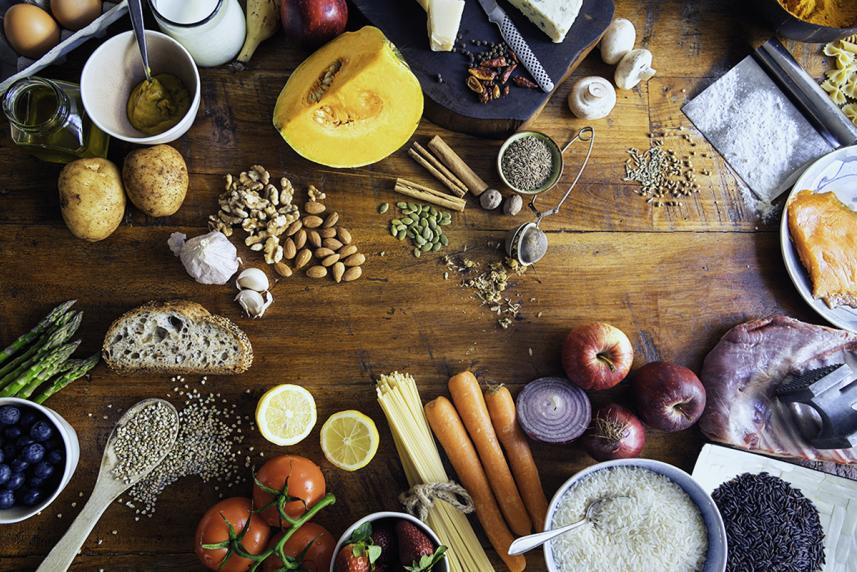
You can use your Blue KC Care Management app to track your health goals, search our resource library, chat with registered nurses and healthcare workers,† and more. Download it today to get started.
Learn the truth about popular but potentially harmful eating plans.

Dieting and the internet can be a chaotic combination. An estimated 45 million Americans are on a diet. And if they search online for ways to lose weight, it can turn up any number of “miracle” diets.
It’s easy to get caught up in diet trends, says Heather Mangieri, RDN. Mangieri is author of Fueling Young Athletes. “There’s no shortage of nutrition misinformation floating around the internet. I could make a full-time job out of explaining the flaws.”
But nutrition is a science, Mangieri says. It’s not an opinion. “Once people stop chasing the latest gimmick and accept that eating a healthy, balanced diet is the best choice, they are on their way to success.”
Ready to hear the facts about some popular fad diets? We asked Mangieri to help us clear up 6 common diet myths.
It seems that everyone has a problem with gluten these days. It’s a protein found in grains like wheat, barley, and rye. But a diet without these grains may be more hyped than healthful.
“There is nothing magical about eliminating gluten from the diet. Unless you have celiac disease or suffer from non-celiac gluten sensitivity,” says Mangieri. Wheat does make its way into a lot of high-carb foods and snacks. Think: pasta, bread, sugary cereals, and baked goods. That’s why cutting out gluten is likely to lead to healthier food choices. But it’s not a guarantee.
"Anyone who trades in brownies and white bread for fruits, vegetables, and lean proteins is going to feel better," says Mangieri. Those trades are also likely to lead to weight loss. Whole foods like these are usually lower in calories than sweets and baked goods. But unless you have a sensitivity to gluten, swapping regular cookies for the gluten-free kind won’t change your weight or well-being.

You can use your Blue KC Care Management app to track your health goals, search our resource library, chat with registered nurses and healthcare workers,† and more. Download it today to get started.
As juice cleanses stay popular, you may wonder: Will liquefying your calories help you shed pounds and detoxify? Mangieri’s take: “Any diet that restricts calories will likely result in weight loss. But that doesn’t make it healthy.” Most detox or cleanse diets are restrictive and unbalanced, she says. They leave out vital nutrients that the body needs.
Juice has the flavor and vitamins of the whole fruit (or vegetable) it’s made from. But it also has all the sugar. And it’s stripped of fiber. The fiber in produce helps slow the absorption of sugar. It makes you feel full. That's what helps with losing weight. And it helps keep it off, too.
Detox programs also don’t typically provide complete proteins. These are proteins that have the 9 essential amino acids the body needs but can’t produce on its own. Complete protein sources include:
Detox diets also tend to lack other key nutrients, such as vitamin D. And they can lead to rebound weight gain. In other words, once you go back to your normal diet, the weight comes back too.
Called the Banana Island Diet, this one was popularized on Instagram. It involves eating 1 type of fruit and nothing else for 3 to 30 days. People on the plan hope it will fix any number of health issues or speed up weight loss.
“Bananas make a great addition to any eating plan. But you won't survive on bananas alone,” says Mangieri. “The body needs a combination of carbohydrates, protein, and healthy fats for proper growth.” Bananas offer some of these, but not all of them. For example, they’re short on healthy fat and protein. A medium banana has:
“Registered dietitians encourage a variety of foods for a reason. You can’t get all of your essential nutrients from one food alone,” Mangieri says.
Fans of the raw diet like that it’s unprocessed and close to nature. They also say it avoids cooking methods that can degrade some nutrients. The truth, as is often the case, is not black and white.
“Following a raw-food diet has some perks,” says Mangieri. It's high in fruits and vegetables. They offer vitamins, minerals, fiber, and more. And it cuts out sugar and unhealthy fats.
But it's hard to get enough of other nutrients like protein, calcium, and vitamin B12. For that reason, some people include raw milk and other unpasteurized dairy products. These foods can contain bacteria that can cause disease, says Mangieri.
What about the dangers of cooking? Some high-heat methods, such as boiling, can cause nutrients to break down or leach out of foods. But this is not true of all heating methods or all foods. In fact, cooking can boost the nutrient content in some foods. For example, heating tomatoes boosts the amount of lycopene, a powerful antioxidant.
At the end of the day, eating a varied diet that includes carbs, fat, and protein is the best way to eat healthily. And cooking makes that a lot easier to do.
You may connect a high-protein diet with muscle building. And muscle does burn more calories than fat. But eating a lot of protein is not an instant recipe for a toned body or weight loss.
“Most adults in the United States get more than enough protein,” says Mangieri. She points out that some people do need extra protein. That includes athletes and people who are pregnant or breastfeeding. But “it’s rare for someone who is healthy and eating a varied diet to not get enough protein.” Women need 46 grams of protein a day. Pregnant or breastfeeding people need 71 grams. Men need 56 grams a day.
If you’re not eating extra calories, there’s no need to burn off calories at the gym … right? “Most weight loss occurs because of decreased caloric intake,” Mangieri says. That is, eating fewer calories while still giving your body the nutrients it needs. But exercise is key to keeping weight off, says Mangieri. “Evidence suggests that to maintain weight loss it is important to participate in regular physical activity.”
Mangieri also stresses that working out isn’t just about weight. There are a lot of other good reasons to exercise. For instance, it helps lower your risk of heart disease and diabetes.
Fad diets are fads for a reason. No “quick fix” will ever do as much for your health or weight as the time-tested wisdom of healthy eating.
So, try to eat plenty of:
Try to limit:
As always, talk with your doctor before you make any major changes to what you eat. And finally, trust your gut. If a diet sounds too good to be true, or too hard to stick with, it probably is.
Article sources:
Celiac disease: Celiac Disease Foundation
Juice-based diet: Mayo Clinic
Raw-food diets: Nutrients
Dietary guidelines: U.S. Department of Agriculture
Physical activity for a healthy weight: Centers for Disease Control and Prevention